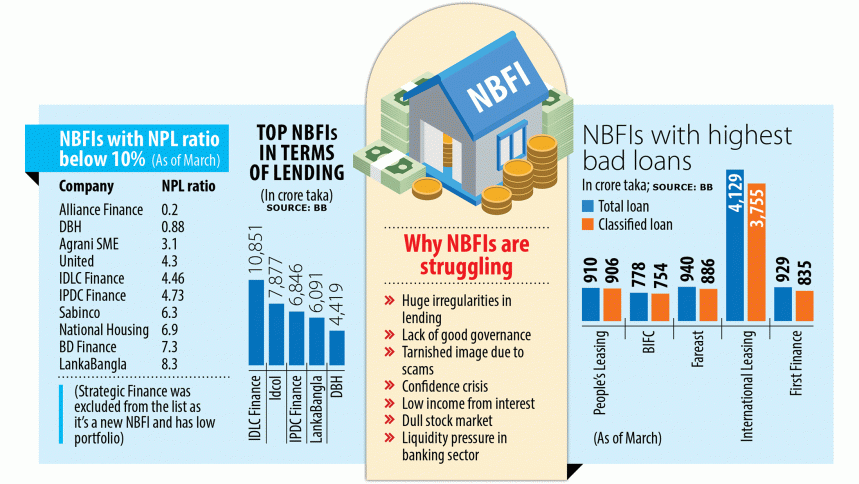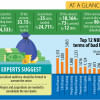16 non-banks weighed down by high NPLs

Nearly half of non-bank financial institutions (NBFIs) saw a third of their loans turn into non-performing ones at the end of March 2023, which gives an indication of the tough times the sector was going through mainly due to massive irregularities in 8 to 10 companies.
Intense competition with banks amidst liquidity pressure, image being tarnished and borrowers finding it tougher to run businesses are mainly to blame for the NBFI sector's struggles.
There are 35 NBFIs in the country. For 16, the nonperforming loan (NPL) ratio is over 30 percent, according to Bangladesh Bank data.
Even more alarming is the fact that six out of the 16 had around 90 percent of their loans turned classified at the end of March 2023.
The six are the People's Leasing and Financial Services Limited, Bangladesh Industrial Finance Company Limited, Fareast Finance & Investment Limited, International Leasing and Financial Services Limited, First Finance Limited and FAS Finance & Investment Limited.
The NBFIs lack good governance, so their NPL ratio is rising, said Anis A Khan, a former chairman of the Association of Bankers, Bangladesh Limited, a platform of the CEOs of lenders.
Most of the members of the board of directors and management team have no proper knowledge on credit issues, so their choice of lending is not faring well, said Khan, also a former managing director of IDLC Finance Limited.
There is a lack of senior officials in the NBFIs to assess and monitor credit. Without proper risk management, a lender's NPL ratio cannot be kept within the safe zone, he said.
"The capital in some of the NBFIs is low compared to their NPLs, which is a matter of serious concern," said Khan, also a former chairman of the Bangladesh Leasing and Finance Companies Association (BLFCA).
He recommended that some of the NBFIs which were staging a poor performance be merged with the big NBFIs so that those could be aptly run at low operational costs.
Due to the high NPL ratio, 25 percent of loans of the NBFI sector has become classified.
The sector's outstanding loans stood at Tk 71,250 crore while classified loans Tk 17,840 crore, according to Bangladesh Bank.
The NPL ratio skyrocketed as the previous board of directors and management failed to perform properly, reasoned Md Mashiur Rahman, managing director of the International Leasing and Financial Services Limited.
"There was theft of funds," he said, adding that now a restructured board was trying to revive the company but none wanted to provide funds.
"As a result, we are trying to include the big depositors, lenders of the NBFIs, especially banks, who lent funds earlier…If they join the board, people's confidence might be regained," he said.
Until the confidence returns, the company will not be able to properly be up and running, Rahman added.
The NPL situation is comparatively better in the banking sector, although it is the second highest in South Asia after Sri Lanka.
In the banking sector, NPLs stood at Tk 131,621 crore as of March 31, accounting for 8.8 per cent of the banking system's outstanding loans of Tk 14,96,346 crore.
Even amidst all the adversities, some NBFIs are still managing to do good business.
The NPL ratio in seven NBFIs remains below 5 percent. They are Strategic Finance & Investments Limited, Alliance Finance Limited, DBH Finance PLC, Agrani SME Financing Company Limited, United Finance Limited, IDLC Finance Limited and IPDC Finance Limited.
Although the NBFI sector is passing a tough period, some companies are doing well in keeping the NPL ratio low, mainly due to good governance, said Md Kyser Hamid, managing director and CEO of Bangladesh Finance.
Most loans turn into non-performing ones when the lender does not adopt good governance in lending, he said.
It is true that some borrowers really face problems and it is a part of the business. But, the NPL ratio rose to a high level due to wilful defaulters working in connivance with board and management team members, he added.
BD Finance's NPL ratio was 7.32 percent.
As the spread in the NBFI sector has shrunk and income from the stock market slumped, profits have been squeezed, Hamid said.
The gap between borrowing and lending rates came down to 0.27 percent in June while it was at an average of 0.75 percent throughout the first six months of the year, as per Bangladesh Bank.
On top of that, liquidity pressure in the money market also impacted the growth of assets of the NBFIs, added Hamid, who is also vice-chairman of the BLFCA.
In June, surplus liquidity in the banking sector stood at Tk 166,200 crore, down from Tk 203,435 crore a year ago, shows the central bank data.
IDLC Finance Limited is the largest NBFI in Bangladesh with outstanding loans amounting to Tk 10,851 crore, followed by Infrastructure Development Company Ltd (Tk 7,877 crore), IPDC Finance Limited (Tk 6,846 crore), LankaBangla Finance Limited (Tk 6,091 crore) and DBH Finance PLC (Tk 4,419 crore).

 For all latest news, follow The Daily Star's Google News channel.
For all latest news, follow The Daily Star's Google News channel. 








Comments